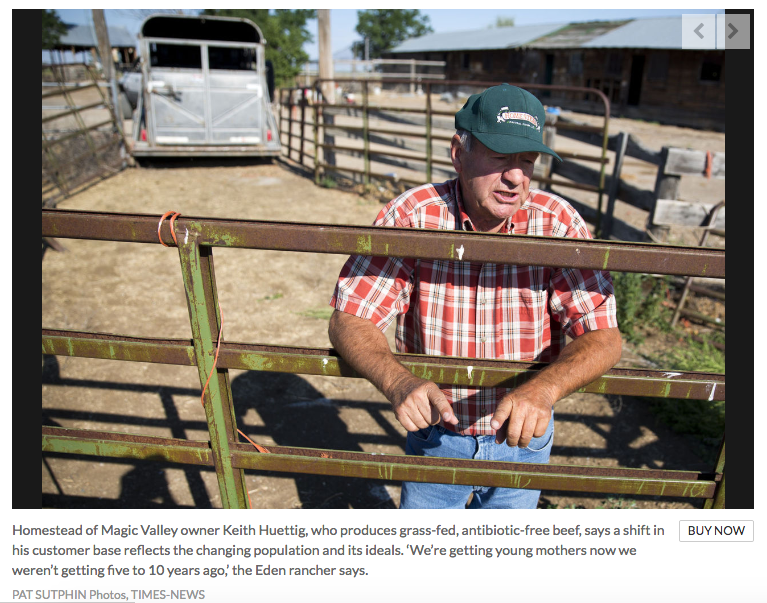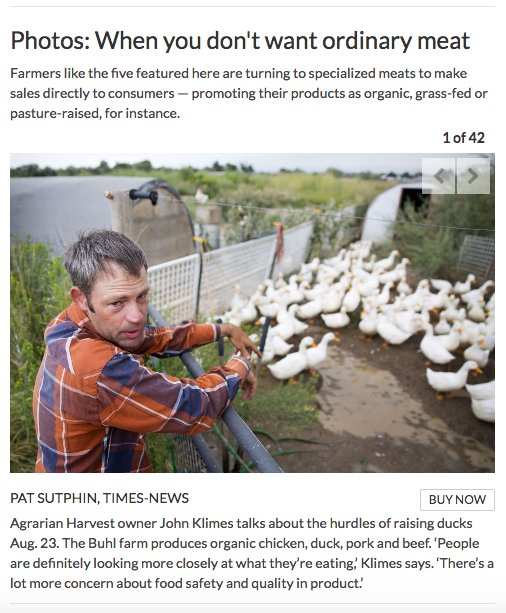MagicValley.com: It’s what a locavore Idaho foodie eats. Producers see rising demand for specialty meats.
TWIN FALLS — Kirk Collins likes to order beef from people he knows. He looks for cattle that haven’t been given hormones or antibiotics and have been fed and raised in a pasture.
“It’s not like they come out of a feedlot,” the Hailey man said. “Generally, they get a good cow life, until — you know.”
Collins — stocking up on local produce at Twin Falls’ Sprouts market after work Aug. 22 — said he appreciates knowing where his food comes from. And he isn’t alone. Local producers say more customers are seeking out healthier meats from animals that are raised away from feedlots, using more traditional and chemical-free methods.
“People are definitely looking more closely at what they’re eating,” Agrarian Harvest owner John Klimes said. “There’s a lot more concern about food safety and quality in product.”
At Crossroads Farmers Market in Shoshone, southern Idahoans and occasional tourists come seeking answers. They want to know where the food was produced. They want to know how the animals were treated. And they want to be sure that what they’re consuming is free of added chemicals or hormones.
Talking to the producer face to face makes all the difference.
“They get to know you, and they can ask you questions,” Crossroads Farmers Market organizer Lucinda Heiken said. “It’s way more personal, and they’re looking for that personal touch.”
Knowing their customers personally holds producers accountable, too.
“The consumer has to look me in the eye and feel like they’re giving a fair price for what they’re getting,” said Klimes, who farms in Buhl.
To offer something that’s not on grocery store shelves and meet consumers’ demand for quality, farmers like the five featured today are turning to specialized meats to make direct sales — promoting their products as organic, grass-fed or pasture-raised. And others have found niche markets for meats less common in retail.
In 2012, the value of direct consumer sales for agricultural products in Idaho was $8.5 million, according to the National Agricultural Statistics Service’s Census of Agriculture. That’s a small, but growing, portion of the state’s $7.8 billion in sales of agricultural products including animals, crops and animal products.
Given the number of Magic Valley farms the Times-News discovered that have started direct sales in the past five years, that number could rise even more for 2017.
And these newer farms are still growing.
Take Hazelton’s Red Star Ranch, which got into grass-finished beef five years ago as a way to supplement its crop income.
“We wanted to diversify our farm and make sure it’s there for the next generation if they want to farm,” said Krista Huettig, who handles the marketing.
The ranch promotes grass-finished beef as a healthier option with less fat. The Huettigs also don’t spray pesticides on the crops the cattle eat. And they market pasture-raised pigs.
“They’re happy little pigs,” Huettig said. “They’re not confined.”
For many consumers, the animal’s quality of life is important. Red Star Ranch sells all of its animals directly to consumers instead of going through commercial retailers or feedlots.
Seeing another, less expensive product, the farm will soon begin selling poultry as well.
Despite increased demand for these meats, Huettig doesn’t feel it’s highly competitive among local producers.
“We’re all little guys,” she said.
Lynn Schaal’s Life Springs Farms sells organic lamb and can’t keep up with demand. The Filer farmer guarantees that his animals don’t eat anything that has been sprayed with non-organic pesticides.
“For me, it only stands to reason you can’t be consuming chemicals,” he said.
What’s behind the growing interest in organic, local and traditionally raised meat products? In some ways, it’s just the southern Idaho mentality, Jerome Farmers Market organizer Kathy Bartholomew said. Farming families understand the importance of eating well and eating healthy.
But it may also stem from an influx of people moving here from larger areas, Heiken said, where food movements such as “organic” are much more popular. And immigrant populations may be used to eating fresher foods than a grocery store can offer.
Homestead of Magic Valley owner Keith Huettig said a shift in his customer base reflects the changing population and its ideals.
“We’re getting young mothers now we weren’t getting five to 10 years ago,” — mothers who are more concerned about what they feed their children, the Eden rancher said.
The demand also reflects a growing movement toward buying local, Heiken said — from a sustainable meat supply that’s healthy and safe.
It’s a change Keith Huettig encourages.
“People have lost touch of where food comes from,” the longtime potato-farmer-turned-rancher said. “People need to reconnect with that.”

